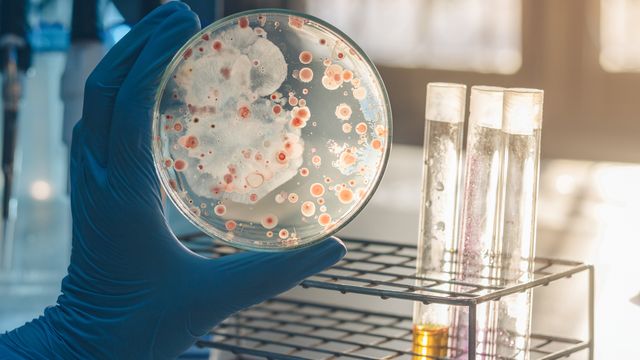Aspergillus spp. Culture Testing in Grain Storage
The presence of Aspergillus species, particularly Aspergillus flavus and Aspergillus parasiticus, can pose significant risks to the quality and safety of grain during storage. These fungi produce harmful metabolites known as mycotoxins that can contaminate stored grains, leading to economic losses, health hazards, and regulatory non-compliance.
Microbiology culture testing for Aspergillus spp. in grain is essential for ensuring food safety standards are met. This service involves the isolation of fungal colonies from samples taken directly from storage areas or during processing stages. Once isolated, the cultures undergo identification using various methods such as microscopy and biochemical tests to confirm the species present.
The importance of this testing cannot be overstated in sectors like agriculture, food production, and pharmaceuticals. It is crucial for maintaining product integrity and preventing contamination that could affect consumer health. Compliance with international standards such as ISO 11731-2:2015 ensures consistency and reliability across the industry.
Testing services include thorough sample preparation, inoculation techniques, incubation conditions tailored to optimal growth of Aspergillus spp., and visual observation under controlled lighting conditions. The process culminates in accurate reporting that includes species identification and quantification data, which are vital for making informed decisions about storage practices.
Given the potential health impacts associated with mycotoxin contamination, this service plays a critical role in safeguarding public health. By identifying and managing Aspergillus spp., stakeholders can implement preventive measures to mitigate risks effectively.
- Sample Preparation: Proper handling of samples is key to accurate testing results.
- Inoculation Techniques: Precise application ensures robust growth for easier identification.
- Incubation Conditions: Controlled temperature and humidity levels are critical for optimal fungal growth.
- Identification Methods: Microscopy, biochemical tests, and molecular techniques contribute to precise species determination.
The significance of this service extends beyond mere compliance; it contributes significantly towards enhancing food safety standards globally. Regular monitoring through culture testing helps in early detection of potential issues, allowing for timely interventions that protect both producers and consumers alike.
Why It Matters
The health implications of Aspergillus spp. contamination in grain cannot be overlooked. Exposure to aflatoxins produced by these fungi has been linked to various diseases including liver cancer, immune suppression, and other serious ailments. Ensuring that grains are free from such contaminants is not just about meeting regulatory requirements; it’s about protecting public health.
For industries reliant on grain as raw material or finished product, maintaining quality standards is paramount. Poorly managed storage conditions can lead to increased spoilage rates due to fungal activity, resulting in significant financial losses. Moreover, non-compliance with food safety regulations may result in product recalls and damage to brand reputation.
From a regulatory perspective, adherence to international standards like ISO 11731-2:2015 ensures that testing practices are consistent across different regions. This harmonization promotes better collaboration among stakeholders and fosters trust within the supply chain. Ultimately, effective management of Aspergillus spp. through culture testing contributes to safer food production processes.
Implementing robust quality assurance measures during grain storage not only enhances product safety but also supports sustainable agricultural practices. By minimizing waste caused by spoilage and ensuring compliance with international standards, organizations can contribute positively to environmental sustainability goals.
Scope and Methodology
The scope of Aspergillus spp. culture testing encompasses the entire process from sample collection through final analysis and reporting. This includes selecting appropriate sampling points within storage facilities, ensuring representative samples are collected at regular intervals.
Sample preparation involves cleaning and sterilizing containers used for collecting grains before use. Samples should be transported under refrigeration to prevent further contamination or spoilage during transit. Upon arrival at the laboratory, samples undergo initial screening to identify any visible signs of mold growth.
Inoculation techniques involve placing a small amount of grain from each sample onto agar media plates pre-cultured with nutrients suitable for Aspergillus spp. Incubation takes place under controlled environmental conditions designed to promote optimal fungal growth without interference from other microorganisms.
Visual observations are made daily over several days until colonies become visible. Once identified, species are confirmed using more advanced techniques such as DNA sequencing if necessary. Quantification data is recorded along with details about the specific type of Aspergillus found in order to provide comprehensive insights into contamination levels present in the sample.
Reporting includes detailed documentation of all steps taken during testing along with results obtained from each stage. This information helps users understand not only what was detected but also how it compares against industry benchmarks or historical trends if available.
Quality and Reliability Assurance
To maintain high standards of accuracy and repeatability in our Aspergillus spp. culture testing, we implement stringent quality control measures at every stage of the process.
- Laboratory Calibration: Regular calibration of all instruments ensures consistent performance.
- Reference Materials: Use of certified reference strains allows for validation of test outcomes against known benchmarks.
- Data Validation: Independent verification of results by multiple analysts reduces the risk of errors.
- Continuous Training: Staff receive ongoing education on latest methodologies and best practices to stay current with evolving standards.
We also participate in proficiency testing programs organized by recognized bodies to further validate our capabilities. By adhering strictly to these protocols, we guarantee the reliability of every result produced.





